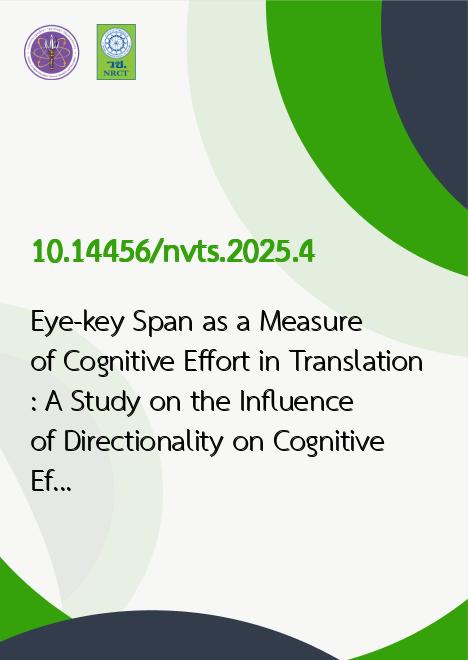
|
Eye-key Span as a Measure of Cognitive Effort in Translation: A Study on the Influence of Directionality on Cognitive Effort |
|---|---|
| รหัสดีโอไอ | |
| Creator | Marcelina Pietryga |
| Title | Eye-key Span as a Measure of Cognitive Effort in Translation: A Study on the Influence of Directionality on Cognitive Effort |
| Publisher | IATIS and Chalermprakiat Center of Translation and Interpretation at Chulalongkorn University |
| Publication Year | 2568 |
| Journal Title | New Voices in Translation Studies |
| Journal Vol. | 30 |
| Journal No. | 1 |
| Page no. | 104-127 |
| Keyword | cognitive effort, directionality, EKS, translation trainees, translation process |
| URL Website | https://newvoices.arts.chula.ac.th/ |
| Website title | New Voices in Translation Studies |
| ISSN | 1819-5644 |
| Abstract | This exploratory study aims to analyze the influence of directionality on cognitive effort, which is operationalized through the eye-key span (EKS). The EKS is measured as a time lag that lasts before the translation of a given collocation from when the participant fixated on it for the last time. The points of interest analyzed in this study are 14 collocations in two texts. Participants worked in both directions in the Polish-English language pair, and the data were collected from 25 translation trainees using eye-tracking and keylogging. It was hypothesized that following the Golden Rule of translation by Peter Newmark (1988), the participants would produce longer EKS in the L1-L2 translation direction. Although some differences in the mean values between the two translation directions can be observed in detail on histograms, the inferential statistics did not confirm the hypothesis as the statistical test did not reach statistical significance. |
